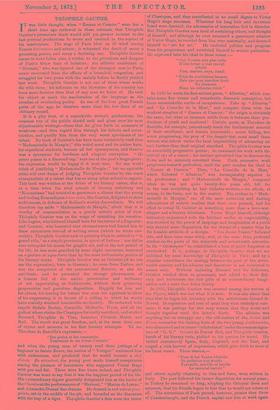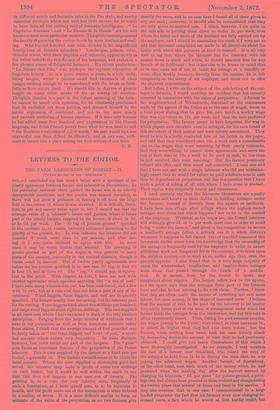THEOPHILE GAUTIER.
Jr was little thought, when " Emma et Camees " were but a short time ago reviewed in these columns, that Theophile 'Gautier's premature death would add yet greater interest to the last poetical productions he wrote and inserted in the reprint of his masterpiece. The siege of Paris blew an ill wind among Trench litterateurs and artists ; it witnessed the death of many a promising genius, and many a declining one. Theophile Gautier seems to have fallen also, a victim to the privations and dangers of Paris's bitter time of isolation ; the athletic combatant of " Hernani," who was reputed one of the strongest men in Paris, 'never recovered from the effects of a bronchial congestion, and struggled for two years with the malady before he finally yielded last week. Theophile Gautier is not one of those whose works die with them ; his influence on the literature of his country has been more decisive than that of any man we know of. He took for object as much the amelioration of the language as the -creation of everlasting poetry. As one of the four great French poets of the age, he deserves more than the few lines of an -obituary record.
It is a pity that, of a remarkable writer's productions, the -common run of the public should seek and gloat over his most objectionable writings—those that he gives forth in moments of weakness—and then regard him through his defects and eccen- tricities, and qualify him from the very worst specimens of his talent. No book of Gautier's has been more extensively read than -" Mademoiselle de Maupin ;" this weird novel and its author have, -for superficial students, become all but synonymous, and Gautier was a synonyme for lewdness and elegant corruption. "Ile pours poison in a diamond cup," says one of the poet's biographers ; the expression would be happy if it were true. No one would think of justifying "Mademoiselle de Manpin ;" but no equitable -critic will ever dream of judging Theophile Gautier by the worst characteristic of a talent that has so many other seductive aspects. This book was written at the debut of his literary career, that is, at a time when the rival schools of literary orthodoxy and "Romantisme" had attained so passionate a climax that the young and boiling Romantiques a tons cries, like Gautier, delighted in sheer recklessness, in defiance of Boileau's worthy descendants. We will therefore lay aside "Mademoiselle de Maupin," albeit that it is worthy of commendation in a purely artistic point of view. Theophile Gautier was on the verge of mistaking his vocation. Like Ingres, who believed himself born for the career of a Paganini ; and Gavarni, who lamented that circumstances had forced him to .draw caricatures instead of writing verses (which he wrote exe- crably), Theophile Gautier took to painting when he arrived in " la grand vine," as a simple provincial, in quest of fortune ; nor did he -ever relinquish his mania for graphic art, and in the last period of his life, he was more gratified by some slight encomium bestowed on a picture or aqua-forte than by the most enthusiastic praises of 'his literary works. Theophile Gautier was an Oriental (if we can use the expression), born in Gascony ; he came from Tarbes, and was the compatriot of the conventional Barrere, as also his antithesis ; and he presented the strange phenomenon of a Gascon full of the native penetration and brilliancy of wit appertaining to Southerners, without their grimacing propensities and garrulous disposition. Happily for him and for others, his leaning for letters was soon too apparent to allow of his suppressing it in favour of a calling in which he would have scarcely attained honourable mediocrity. He eschewed with superb disdain Racine, Corneille, Malherbe, Duels, and all the ,gods at whose shrine the Classiques fervently sacrificed, and studied Ronsard, Theophile de Viau, Lemoine, Clement Marot, and Bait'. The result was great freedom, and, at the same time, ease of rhyme and measure in his first literary attempts. To use Theodore de Banville's expression,
"Des perlea et des dmerandes Tombaient de see levres d'enfant;"
and when the young man of twenty read these jottings of a 'beginner to Sainte Beuve, the author of " Volupte " embraced him with enthusiasm, and predicted that he would become a def d'dcole. En attendant, the young poet made himself conspicuous among the phalanx of innovators who supported Victor Hugo with pen and fist. These were fine times indeed, and Theophile Gautier was wont to say that it was the happiest period of his life. His extraordinary vigour generally designated him as the leader of the Clievelusat the performances of "Hernani," "Marion de Lorme," -and Alexandre Dumas' fine dramas. He dressed in red velvet pour- points, sat in the middle of the pit, and bounded on the dissenters with the leap of a tiger. Theophile Gautier's fists were the terror
of Classiques, and they contributed in no small degree to Victor Hugo's stage successes. Wherever his long hair and luxuriant beard were descried, the adversaries of innovation fled in disorder. But Theophile Gautier soon tired of sustaining others, and thought of himself ; and although he ever remained a passionate admirer of Victor Hugo, he receded from him very materially, and devoted himself to "art for art." He excluded politics and progress from his programme, and restricted himself to artistic perfection. He expressed later his ideal in these verses :—
" Oui, l'aiuvre sort plus belle D'une forme iv tout travail rebelle Vera, marbre, onyx, email.
"Point de contraintes faunas, Mais quo pour marcher droll Ta chausses,
Muse, uu cothurne etroit."
In 1830 he wrote his first serious poem, " Albertus," which con- tains some fine verses and remarkable dramatic conception, but bears unmistakable marks of inexperience. Take up " Albertus "
and "La Comedic de la Mort," and compare them with the weakest strophes of " Emaux et Camees ; " the origin is obviously the same, but what an immense stride there is between these pro- ductions of youth and manhood ! Certain poets, as Theodore de Banville, for example, precociously reach the farthermost summit of their excellence, and remain immovable ; never falling, but never progressing, the prey of the despair that must assail those writers who labour under the fatal impossibility of advancing an inch further than their original standard. Theophile Gautier was an essentially progressive genius ; he examined his work with the
critical eye of a censor ; his instinct permitted him to discover the fli ws, and he minutely corrented them. Each successive work progresses towards perfection, until the poet reaches his ideal in
" Emaux et Cameea." Thus, "La Comedic) do la Mort," which followed " Alberti's," was incomparably superior to its predecessor ; and " Mademoiselle de Maupin," composed when be was not quite twenty-five years old, left far in the rear everything he had hitherto written,—we allude, of course, to the form, not to the matter. The preface to Made- moiselle de Maupin," one of the most audacious and dashing affirmations of artistic realism that were ever penned, had for effect to reveal M. Gautier as something more than a hero-wor- shipper and a literary dilettante. Victor Hugo himself, although intimately acquainted with the brilliant scoffer at respectability, was startled by the power of language and imagination of a youth who showed more disposition for the throne of a master than for the humble attitude of a disciple. "Lea Jeune France" followed this, and then come some witty, and, at the same time, profound studies on the poets of the sixteenth and seventeenth centuries, In his "Grotesques" he rehabilitated a host of poets forgotten or overlooked. It is, perhaps, to Theophile Gautier that we are indebted for some knowledge of Theophile de Viau ; and by a singular coincidence the analogy between the poet of the seven- teenth century and his admirer and discoverer is not restricted to names only. Without imitating Ronsard and his followers, Gautier studied them as grammars, and added to their deli- cacy and tenderness the rich gifts of an extraordinary imagi- nation and a taste that defies rivalry.
In 1833, Theophile Gautier was counted among the writers of
the Figaro, which was not what it is now. It was also about that time that he began his intimacy with the unfortunate Gerard de Nerval. In aspiration and turn of mind they were entirely at vari-
ance; it was perhaps for this very reason that they wrote and thought together until the latter's death. The alliance was anything but an unhappy one ; the old readers of the Artiste and Presse remember the dashing feats of the two young feuilletonistes, who alternated and at times" collaborated " uuder the com mon signa- ture of "(I. G." Gerard de Norval died, and Theophile Gautier,
bereft of his literary twin, yielded to his passion for travel. He visited successively Spain, Italy, England, and the East, and reaped a rich harvest of impressions, which gave birth to most of his finest verses. These stanzas,— "Pour le bat Venise s'habille De paillettes tout itoilde Fourniille,scintille et babille Le carnaval bariold."
and others equally charming in idea and form, were written in Italy. The poet followed his truant disposition for several years ; in Turkey he remained so long, adopting the Oriental dress and manners, that his friends began to fear that he would not return at all. The attractions of Paris proved, however, greater than those of Constantinople, and the French capital saw him at work again
on different novels and fantastic tales in the Poe style, and sundry theatrical attempts which met with but little success, for he seems to have been all but entirely void of dramatic intelligence. "Le Capitaine Fracasse" and "IA Roman de la Momie" are too well known to need more particular mention. TheophileGautierpossessed the faculty of guessing the couleur locale by mere instinct and read- ing. Who has not followed him with wonder in his magnificent descriptions of Eastern splendour? Landscapes, palaces, ruins, Oriental towns, with their pagodas and minarets, appear slowly as the writer unfolds the rich fluency of his language, and evokes in a few phrases scenes of delightful harmony. His recent production, "La Nature chez Elle," was, perhaps, the supreme expression of linguistic beauty. It is a poem written in prose, in a soft, undu- lating tongue, where a painter could find thousands of ideal images striking enough to be reproduced with the brush as faith- fully as from nature itself. We should like to digress at greater length on many other works of his as worthy of mention. Th6ophile Gautier is a poet in the fullest meaning of the term ; he cannot be taxed with cynicism, for he constantly proclaimed that he excluded art from politics, and devoted himself to the tender expression of sentiment, and not to the more manly and uncouth rendering of human passions. If it were only because he has added some four hundred new expressions to the French language, and freed French poetry from what he was wont to call "the Racinian vocabulary of 1,500 words," his part would be a less ungrateful one than Alfred de Musset's, and in any case, suffi- cient to insure him a place among the first writers of the time.
C. B.



































 Previous page
Previous page